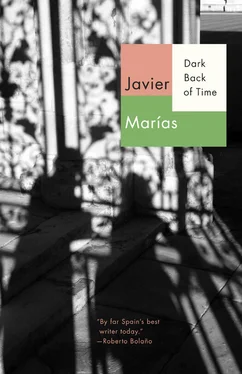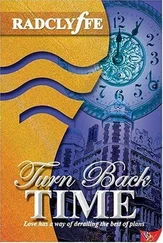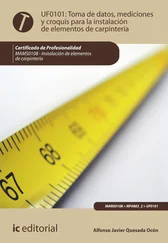Where Toby Rylands was concerned, my ex-boss Michael, to my sorrow, confirmed the initial rumors going around the Sub-Faculty. For reasons that were not known with any certainty, he had apparently hurled his copy of my book angrily down onto the grass in his garden, where it probably still moldered at that hour, soaked and warped by the intermittent rain and phlegmatic sun, perhaps chewed by some passing dog — a three-legged dog, perhaps, that had run away from its master. Ian told me he thought Toby must have been annoyed by the mention of his adventures in espionage and other escapades — the Spanish word Ian used was correrías , the type of word learned foreigners quickly pick up and enjoy using; I, who owe them so much, have used it here in connection with one of them, the bandit Dean of Canterbury, who almost left me forever in limbo — because it irritated Toby to have it spoken of in public, even more so in print. “But the character isn’t him,” I protested, “though I may have taken some of his physical characteristics on loan; there’s not a word spoken by Toby Rylands that I’ve ever heard Toby say, and I didn’t and still don’t know anything about any such activities.” “No?” Ian confined himself to answering once again; he wasn’t accepting any of my denials despite having seen clearly that this was not a roman à clef . “No,” I insisted, “it’s the first I’ve heard of it: I only imagined, made things up, that’s all.” Ian’s letter was dated on St. George’s Day 1989, and our conversation took place four or five days later. It left me very concerned about Toby. He was the one who had all but asked to appear as a character in the book, even if he was half joking, and now he was angry about a mild resemblance and a few involuntary coincidences. Not only did I greatly regret his wrath, which baffled me, but I also had to prepare myself to live in fear of some long-distance punishment if he deemed my recklessness or offense deserving of one, I didn’t even want to think about the vile aberrations he might accuse me of if that were the case, practices that exist only in textbooks. (Although I have no interest whatsoever in teaching, in America or anywhere else, my teaching days are over, and while they weren’t over yet then, I was only looking for the conviction and a suitable pretext to bring them to an end.)
A week later my dismay had largely vanished, again thanks to the skeptical I. D. L. Michael, sometimes called “Ideal M” because of his initials, who took the trouble to phone me from Exeter College, full of excitement, in the sole and benevolent aim of filling me in on the conversation about my book he had just finally had with Toby Rylands in the Senior Common Room of the Taylorian, with its pay-as-you-go electric coffee pot. The cause of Rylands’ ire was indeed as Ian Michael had imagined; he certainly did not remember that he had never actually told me anything concrete about his recruitment by the secret services or his special missions in exotic places or other escapades, he hadn’t even given me a proper account of the witty prince he had gone on binges with. The volume, flung from his colonial rattan chair, had lain on the scraggly lawn for nine or ten nights and days, after which, still somewhat intrigued by what he had read before the wrathful interruption — and having uneasily caught sight, from his window, of the tempting book, semi-sheltered by a climbing vine next to which it had fallen — he’d plucked it from the foliage, brushed it off, smoothed down its pages, started over from the beginning and devoured it in a few hours. I held my breath. “He liked it,” Ian told me after an inopportune pause whose only conceivable purpose was to prolong my agitation: “He thinks it’s your best novel yet. He still isn’t amused by your mentioning the espionage, especially not the bit about Haiti, but he says that in the end he has nothing to complain of, since, in his opinion, he inspired the most attractive character in the book, the most profound and memorable, the strongest, the one who says the most intelligent things. In fact, he’s now taken the character for his own; it wouldn’t surprise me if he soon started imitating him a little. He even repeated to me, as an original line of his own, a sentence your character says.” I let out my breath, gladdened and relieved, among other and more important reasons because I saw myself freed from the specter of being accused of the wide variety of depravities I had been dreading for a week by then, balanism, strangury, satyriasis, nequicia, mictionism, pyromania, enfiteusis, positivism, erotesis, felo-de-se, or perhaps even lardy-dardiness, though I don’t know if any of those words, which have cropped up here and there in my translations, correspond to vices (I think not) and I’m not about to go and look them all up right now, but their obscene or sinister sonority alone makes them all, without exception, deserve to be tremendous perversions — irreversible degenerations. It would have pained me to be accused of enfiteusis.
I couldn’t help feeling some curiosity, which I didn’t consider vulgar this time; “Oh really? What sentence was it?” I asked my ex-boss. “We were talking about my cobaltic eczema or some ailment of his when he suddenly murmured pensively ‘To whom does the sick man’s will belong? To the sick man or to the disease?’ Well, something like that, I don’t know if he cited it verbatim. Did he cite it verbatim?” “I don’t know, I don’t remember; I don’t know every word of my book verbatim,” I answered, echoing his British Latin-ism, and then inquiring farther: “And what’s the problem with Haiti?” “Oh, I don’t know, you’re the one who knows, you mentioned it in the novel.”
I swear I knew absolutely nothing about any role played by Haiti in Toby Rylands’ dispersed and shrouded past. I could just as easily have said Honduras or Belize, Antigua or Montserrat or Barbuda, yet what I wrote was Haiti where, it now turned out, he had experienced some vicissitudes or left some trace of his escapades; perhaps the boisterous prince was from that island. I refrained from mentioning to Ian — so that he wouldn’t tell Toby about it, there’s a certain verbal incontinence in Oxford for which the city’s inhabitants should not be held too much to blame, it’s in the air there, a tendency to instantly release whatever information is acquired, everyone is at risk but everyone also gains — that some of the fictional Toby Rylands’ thoughts were more in the spirit of one of the most kindly and astute old men I’ve ever known, the poet Vicente Aleixandre, who often spoke laughingly and with derision of his ailments, calling them “ mis lacras ,” “my scourges,” to mollify them; and the other reflections were invented. I preferred that Toby take all of them for his own as time went on, if he wanted to and the fog of memory favored it; they’re his already if he wants them, no longer mine or my poet friend’s, they are much more his now, that’s how I see it anyway; Toby was also astute, and kindly in his way, though more caustic and punitive, and not as warm. “He liked the way you describe his laugh,” Ian added, “so I think that despite earlier indicators we’ve won him over to the cause.” I was silent, listening to my ex-boss absently hum a melody that seemed to me to be a well-known ballad that speaks or tells the story of the Molly Maguires, the Irish secret society whose members disguised themselves as women to strike their blows and bring terror to the police and the judiciary around 1843, emerging again later, thousands of miles away, among the Irish who immigrated to Pennsylvania, I know all of this, believe it or not, primarily because there was a movie about them with the Scotsman Sean Connery. Ian Michael is Welsh, but the character in the novel who could most closely be compared to him was Irish, Aidan Kavanagh. “The cause,” I thought, and immediately there came to mind the famous and mysterious passage, this time indeed verbatim: “It is the cause, it is the cause my soul, — / Let me not name it to you, you chaste stars! — / It is the cause. — Yet I’ll not shed her blood; / Nor scar that whiter skin of hers than snow.…” Othello says this to himself just before killing Desdemona who is sleeping her innocent sleep but will awake to learn of her own death; and four centuries after he spoke those words for the first time we still don’t entirely know what cause it is that should not be named to the stars, or what Othello meant by the enigmatic and repeated words, “It is the cause, it is the cause”; he didn’t even say “She is the cause.” I was still thinking about the unknown woman in Oxford, now believed to be an adulteress, and I was the cause, both her Cassio and her Iago, the false lover and the man who incited suspicion, not with my whisperings but with my writings, though without wanting to or foreseeing it. “I hope it’s not an Othello she’s with,” I thought; “it almost certainly is not, there aren’t many left these days, at least not in England. Yet there are still Iagos everywhere.” And I’m not sure whether I didn’t think the second of these three things only in order to calm my fears. “… And smooth as monumental alabaster. / Yet she must die, else she’ll betray more men. / Put out the light, and then put out the light …,” Othello goes on, and I went on remembering. “Hey, how’s the atomic carpet?” I asked Ian then, breaking in on his absentminded ditty and my thoughts and citations. “Is it still giving off radioactivity, or is it just shooting up X-rays to unmask you?”
Читать дальше












